Mikey Lukanowski is a UK based Software Engineer with a strong passion for helping those in need. He has been involved with a local charity called Urbond where he undertakes various projects with the most recent being building and equipping an IT classroom in Guinea, Africa. As a passion project, Mikey runs his own fitness blog called Workoutcave: a place where people can turn for a simple and realistic home workout ideas.
We interviewed him about the project he carried out in Dubreka.
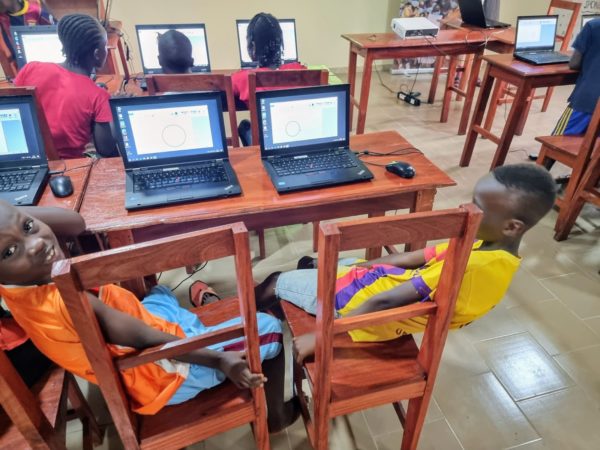 You were already volunteering in Uk with Urbond. What encouraged you to go personally in one of the poorest areas of the world?
You were already volunteering in Uk with Urbond. What encouraged you to go personally in one of the poorest areas of the world?
That’s true, I have been involved with the URBOND Charity for the past 3 years mostly being based in the UK.
Working alongside Drame, the founder of the charity, and seeing his passion and the enormous amount of work he put into organizing a volunteering trip to Guinea, made me realize that I wanted to help even more in the field, outside of my homeland.
Once I spoke with my friends and family and they all got excited and supportive of my idea of going to Guinea, I knew it was the right decision. With no second thought, I started getting things ready for the trip.
How was the impact with Dubreka’s reality?
Durebeka’s reality was a culture shock for me, to be honest. It was very hot and immensely overcrowded and I was shaken (literally) by the condition of the roads.
The level of poverty broke my heart many times and at the end of the day, I felt so grateful for my comfortable life in the UK. This experience made me realize how lucky and fortunate I am to have a house, and car, and be able to afford good food and water on a regular basis.
Both the kids and locals were extremely happy and appreciative that we had chosen to help their community. Everywhere I went I was sincerely greeted with beaming smiles, laughter, dancing, and music. That was amazing!
Can we say that your experience shows once again that education is the key to community development (perhaps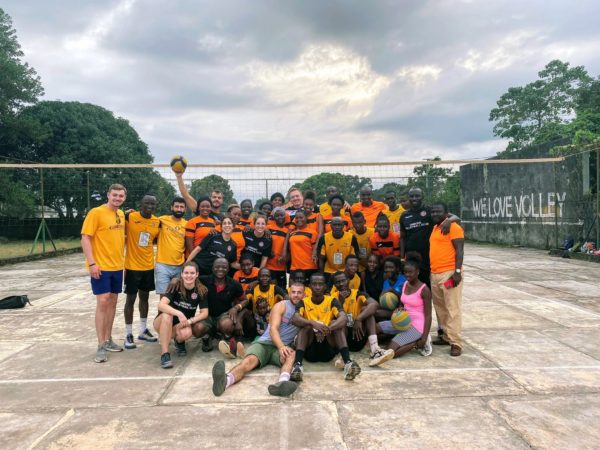 together with sport)?
together with sport)?
Absolutely! Bringing IT to a new school in Dubreka and providing local kids with books to study while making sure that they have everything they need to play some sport after school, definitely impacted the growth of Dureka’s community. These kids are busy studying and playing volleyball hence more connected to each other and their families.
What is the biggest lesson you learnt from this experience?
I’ve learned a lot during this trip. One of the most important learnings was realizing how good my current life is. I started feeling more grateful for everything I have: my own place in the UK, being surrounded by supportive family, having good food served every day, and having access to water. Something that locals and the kids in Dubreka don’t have and they still remain happy which is truly inspiring to me. Also, I’ve learned that education is really the most powerful weapon to change the world and unite people.
How this experience impacts today on your life and on your way to relating to others? How getting involved directly boosted your empathy?
As mentioned already, I am more grateful and appreciative. I no longer complain about some small inconvenience that happens to me on a regular basis such as traffic or last-minute plan cancellation by my friends and family.
I indeed developed more empathy towards not only others but also myself. I tend to be harsh on myself and since this trip happened, I’ve been practicing more self-love and self-compassion. This is a hard and everyday practice but so rewarding!
I’ve seen that you went to Guinea with an eleven people team. Is empathy contagious? And how important is to work in a team to get results?
Yes, it was a big group of international volunteers that joined the trip, including my best friend and fellow blogger Agness of Etramping who also shared her Guinea volunteering experience of helping to build a library and a computer room in Dubreka with Urbond on her blog.
I knew most of the volunteers from the volleyball team that I belong to. They were all enthusiastic about helping others and making a big difference in Dubreka. These awesome people are full of empathy, and love and they cared so much about the kids. I can truly say that empathy is contagious.

I wouldn’t do the work I did in Dubreka if I was there on my own. It was definitely the team effort that made this trip so successful. We all joined the forces every single day and together we were able to build, paint and facilitate the school with laptops and books. While I was setting up the computer room, my fellow volunteers were painting the walls, cementing the floors, and building strong connections with locals and kids.
Are you still in touch with the community you met in Dubreka? What are your plans? Do you have other projects in mind?
Yes, I am still in touch with everyone and I am actively volunteering at URBOND. I also offer remote support to the URBOND IT teacher in Guinea. Additionally, I meet Drame on a regular basis to see what else can be done to support the community. Recently I have also started another fundraiser to help the Dubreka volleyball team to improve their training facility.
Interview collected by Giuliana Arena
April 2022
All photos ©Mikey Lukanowski

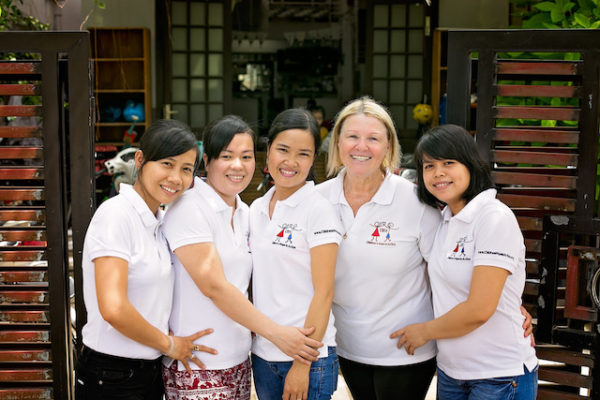
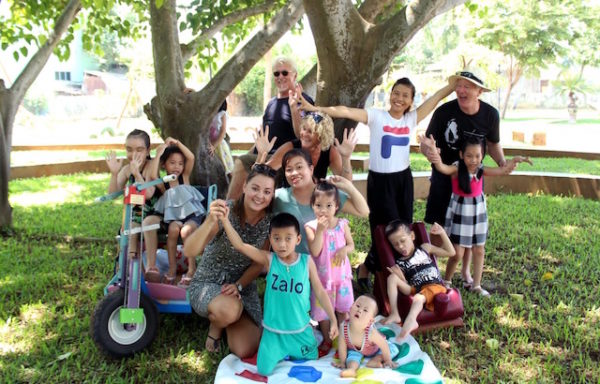
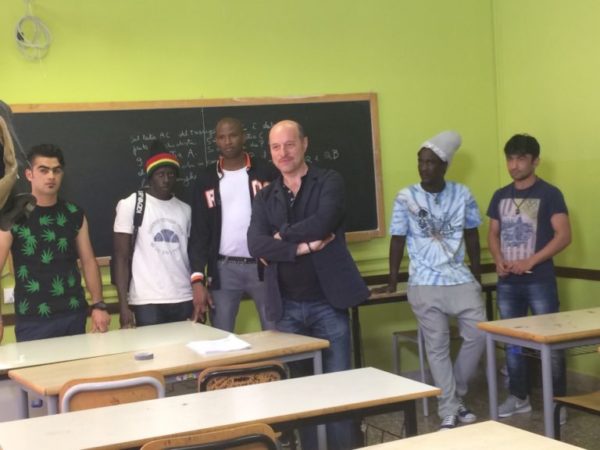
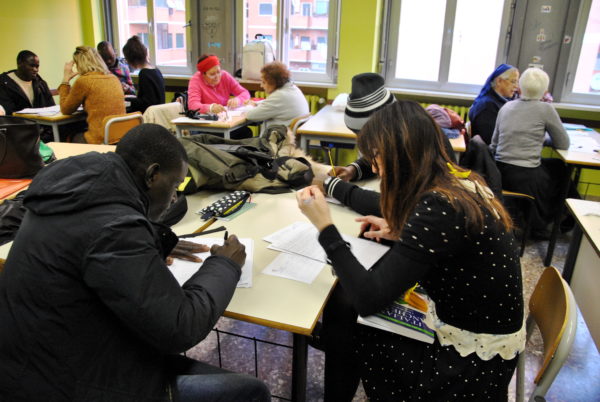 Teachers are individuals, with different beliefs and experiences, who give their time to this project for their own reasons, however, “in the end they are all driven by the same desire to give”. This reminds us of our
Teachers are individuals, with different beliefs and experiences, who give their time to this project for their own reasons, however, “in the end they are all driven by the same desire to give”. This reminds us of our 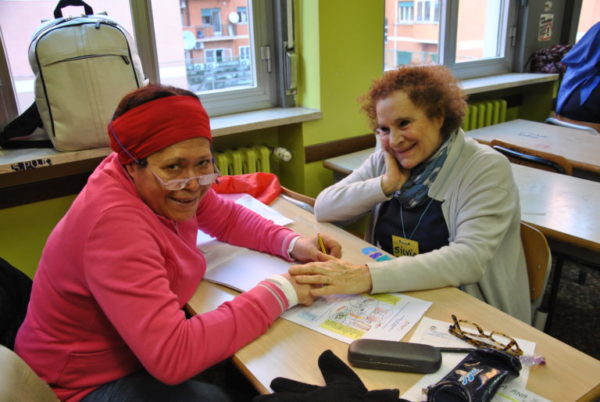
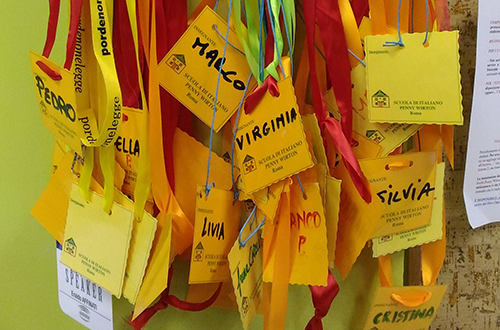 Our school is based on a kind of freedom which is unthinkable in institutional structures, the freedom that comes from a direct personal relationship, one to one or in very small groups, made possible by the many people that are willing to teach for free: both students and teachers are volunteers. There are no classrooms, no marks. The only grade book used is to describe the work being done. We register attendance, not absence. We write down names and activities of the students, to allow every teacher to follow the student’s progress. The only style is the contact, the relationship between student and teacher, who sit side by side and “study” each other reciprocally.
Our school is based on a kind of freedom which is unthinkable in institutional structures, the freedom that comes from a direct personal relationship, one to one or in very small groups, made possible by the many people that are willing to teach for free: both students and teachers are volunteers. There are no classrooms, no marks. The only grade book used is to describe the work being done. We register attendance, not absence. We write down names and activities of the students, to allow every teacher to follow the student’s progress. The only style is the contact, the relationship between student and teacher, who sit side by side and “study” each other reciprocally.